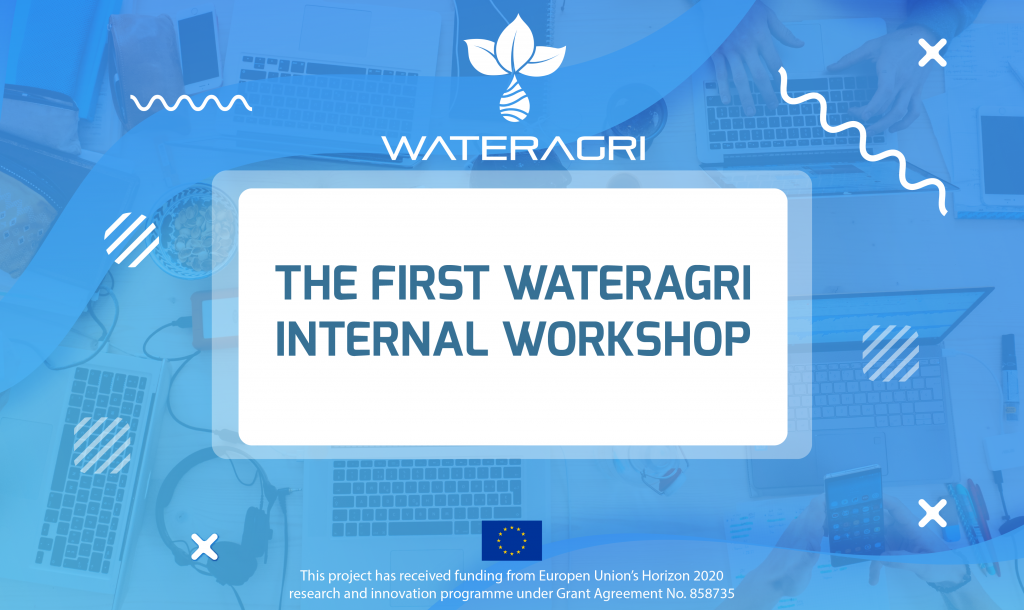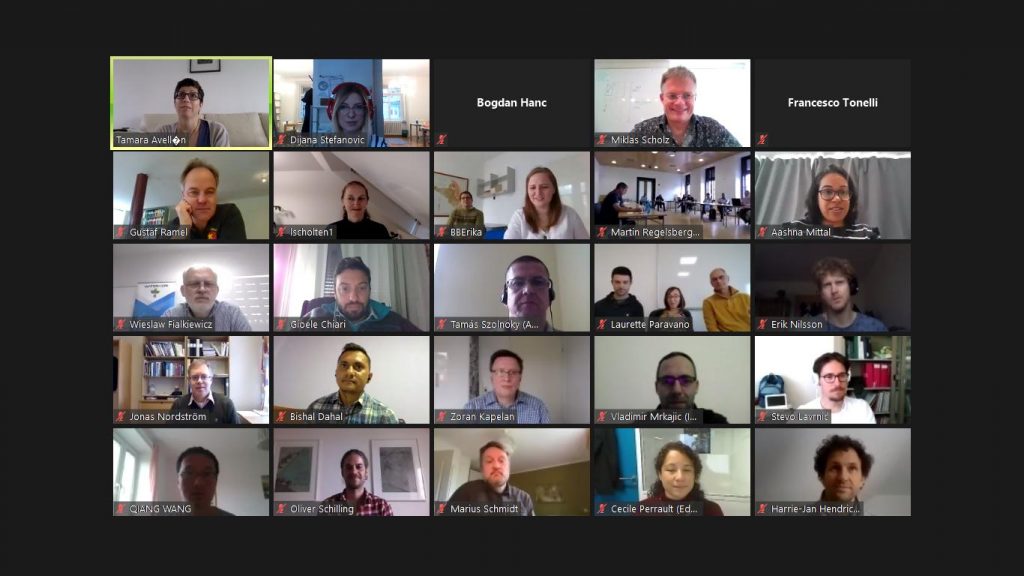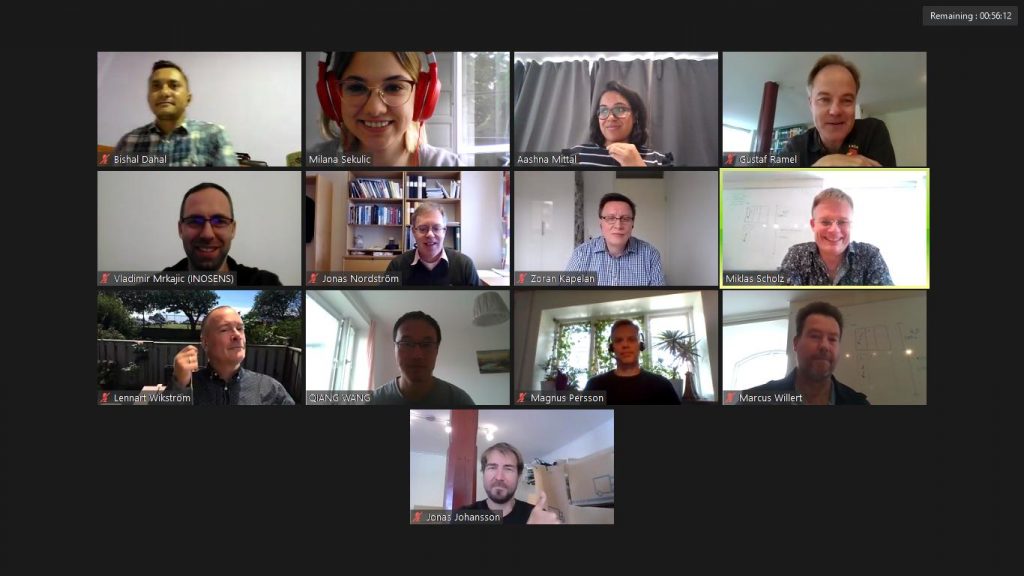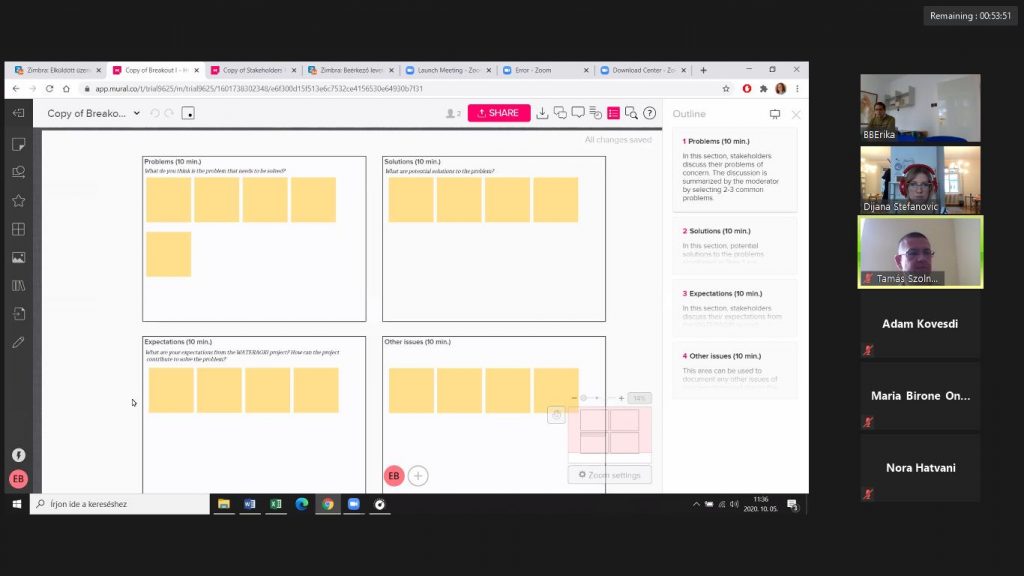The main objective of the event is to provide (internal and) external stakeholders with a general understanding of the WATERAGRI project, its goals, methods, and intended knowledge generation modalities and obtain stakeholders’ feedback on these.
Recap of the WATERAGRI Internal workshop

This early engagement workshop was organized with the purpose of familiarizing the WATERAGRI Community with the WATERAGRI project goals and methods, as well as to gather related stakeholders’ feedback. The organization of the workshop was set in a way that it could allow information sharing in a virtual plenary and for 9 break-out discussions devoted to each case study location. The consortium partner “Gårdstånga Nygård” from Lund (Sweden) was the virtual host of the central meeting of this hybrid workshop.
The opening of the workshop was marked with the WATERAGRI project introduction by the project coordinator Prof. Miklas Scholz, after which the workshop progressed to the virtual plenary presentations of the WATERAGRI solution providers’ 5 minute- pitches. There were 8 such pitches. The first one was presented by Dr. Emanuele Ranieri, Data Analyst from AGRICOLUS based in Italy and it revolved around the cloud-based Agricolus platform which combines environmental data, forecasting models and field observations in a web-based ecosystem to support farmers and advisers in the water resources management. The second one was the presentation of Ms. Anna Biebl from Austrian Alchemia-nova , which introduced its addition of Biochar, charcoal made by pyrolysis, as an additive to the soil for water retention. The presentation of Mr. Akos Koos, Head of the Department of Biomass Production and Valorisation in Bay Zoltán from Hungary, offered insight into their development of organic water retainer product, while Dr. Cécile M. Perrault, the Chief Scientific Officer in Eden Tech from France, focused on the use of microfluidics in the water treatment and their application in the WATERAGRI project for the recovery of the micronutrients. Furthermore, Dr. Suhad Almuktar showcased the importance of wetland systems, as a proposed solution of the WATERAGRI project coordinator Lund University in Sweden. Dr. Christian Clausner from The University of Salford, UK, on contrary, represented the Dewaterability Estimation Test (DET) for sludge estimation. The team of Finnish VTT (Dr. Tekla Tammelin, Ms. Mona Arnold, and Dr. Alexey Khakalo) also introduced the use of biobased membranes as efficient nutrient collectors. Last, but not least, Mr. Qiang Wang from Vultus AB in Sweden explained how information about crop status and fertilization could be given by remote sensing and machine learning pipeline.

Before the break-out discussions, Adriano Battilani, Senior Researcher at the Canale Emiliano Romagnolo (CER), talked about the farming community engagement in water management as one of the focuses of the WATERAGRI project.
After this abundant presentation, the workshop proceeded to its’ core, two group sessions split into six break-out discussions by case study locations (France, Germany, Hungary, Italy, Poland, Sweden) There were 89 participants in total that were enabled to follow and participate in sessions in six languages (French, German, Hungarian, Italian, Polish and English).

The first set of break-out group sessions revolved around WATERAGRI solution owners having in-depth discussions with stakeholders about their local needs. The sessions were fruitful since the participants had a chance to define the problems that they face in every day-water management, but also jointly offer the solutions for the said, as well as express their expectations from the WATERAGRI project in solving their issues.
The second set of break-out group sessions was all about WATERAGRI stakeholder identification and mapping. These activities unfolded in the following manner: the participants were ought to identify the local project stakeholders (based on the case study area) and classify them in the suggested categories (Policy Makers at local level/Municipalities; Local Water Management Organizations; Farmers or Farm Managers; Agricultural Chambers/Farmer Associations). After the categorization, the participants had a task to map the classified stakeholders on the interest/power grid in defined categories.

Overall, the 1st Consultation Workshop turned out to be successful since 89 registered participants from over 10 countries had a chance to gain a broader knowledge about the aims of the WATERAGRI projects and its’ water retention solutions, but also express their own statements about their needs and intentions towards the topic of the WATERAGRI, allowing the project to push the stakeholder engagement as one of its’ goals even further!